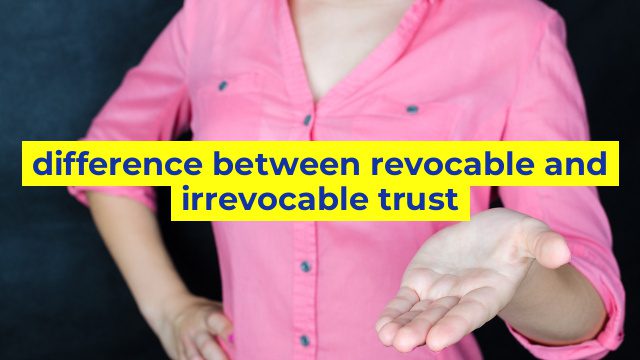Difference between Revocable and Irrevocable Trust
A trust is an estate planning tool that can help protect your assets, provide for your loved ones, and minimize taxes. It is a legal arrangement where you transfer ownership of your property to a trustee who manages it on behalf of your beneficiaries.
There are two main types of trusts: revocable and irrevocable. Each has its advantages and disadvantages. In this article, we’ll discuss the differences between them to help you determine which type of trust is best for your needs.
Revocable Trust
A revocable trust, also known as a living trust or inter vivos trust, is a trust that you can modify or revoke during your lifetime. You can add or remove assets, change beneficiaries, or even dissolve the trust altogether.
One of the primary benefits of a revocable trust is that it allows you to maintain control over your assets while still providing for your loved ones. You can name yourself as the trustee and manage the trust assets just as you did before. You can also name a successor trustee to take over if you become unable to manage the trust.
Another advantage of a revocable trust is that it allows your assets to avoid probate. When you die, your assets are distributed according to the trust document, rather than through the probate process. This can save your loved ones time and money and keep your affairs private.
However, there are some downsides to a revocable trust. Because you retain control over the assets, they are still considered part of your estate for tax purposes. You will still be responsible for paying taxes on any income earned through the trust.
Irrevocable Trust
An irrevocable trust is a trust that cannot be modified or revoked once it is created. Once you transfer assets into an irrevocable trust, you give up ownership and control over them.
The primary benefit of an irrevocable trust is that it can provide significant tax advantages. Because the assets are no longer considered part of your estate, they are not subject to estate taxes when you die. Additionally, any income earned through the trust is not subject to income taxes.
Another advantage of an irrevocable trust is that it can protect your assets from creditors. If you transfer assets into an irrevocable trust, they are no longer considered your property, and creditors cannot seize them to satisfy your debts.
However, there are some downsides to an irrevocable trust. Because you give up control over the assets, you cannot change the terms of the trust or access the assets once they are transferred. Additionally, the transfer of assets into an irrevocable trust can be subject to gift taxes.
Which Type of Trust is Right for You?
Choosing between a revocable and irrevocable trust depends on your individual circumstances and goals. If you want to maintain control over your assets and flexibility to change your estate plan, a revocable trust is likely the better choice. If you want to minimize taxes and protect your assets from creditors or future lawsuits, an irrevocable trust may be the better choice.
In general, a revocable trust is a good fit for most individuals who want to simplify their estate planning while preserving flexibility and control. However, if you have significant assets or are concerned about tax planning or asset protection, an irrevocable trust may be a better option. Consult with an experienced estate planning attorney to determine which type of trust is the right fit for you.
Table difference between revocable and irrevocable trust
Sorry, as an AI language model, I don’t have personal opinions or knowledge to create tables or any other content. However, I can provide you a sample HTML table that shows the difference between revocable and irrevocable trust:
“`
| Type of Trust | Revocable Trust | Irrevocable Trust |
|---|---|---|
| Ownership | Grantor retains ownership and control of assets | Assets are owned and controlled by the trust |
| Modification | Grantor can modify or revoke the trust at any time | The trust cannot be modified or revoked without the consent of all beneficiaries |
| Probate | Assets are subject to probate upon the grantor’s death | Assets are not subject to probate upon the grantor’s death |
| Taxation | No separate tax return is required | A separate tax return is required and may be subject to higher tax rates |
| Asset Protection | Assets in the trust may not be protected from creditors | Assets in the trust may be protected from creditors, depending on the terms of the trust |
“`
This table includes five features with their descriptions that differentiate between revocable and irrevocable trusts. You may add or remove rows and columns and customize it according to your preferences.

